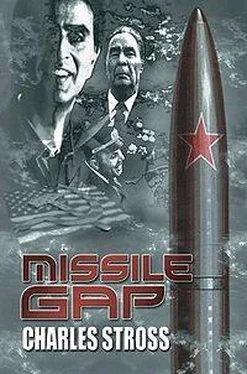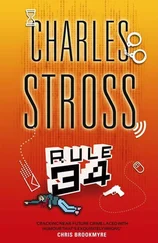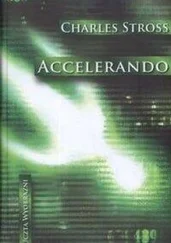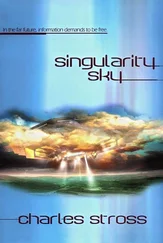Bob kept going on about how materials scientists from NOAA and the National Institutes were still trying to understand what they were made of, until Maddy snapped at him. He didn't seem to understand that they were the bars on a prison cell. He seemed to see a waterway as wide as the English Channel, and a gateway to the future: but Maddy saw them as a sign that her old life was over.
If only Bob and her father hadn't argued; or if Mum hadn't tried to pick a fight with her over Bob — Maddy leans on the railing and sighs, and a moment later nearly jumps out of her skin as a strange man clears his throat behind her.
"Excuse me, I didn't mean to disturb you."
"That's alright," Maddy replies, irritated and trying to conceal it. "I was just going in."
"A shame: it's a beautiful night," says the stranger. He turns and puts down a large briefcase next to the railing, fiddling with the latches. "Not a cloud in sight, just right for stargazing." She focuses on him, seeing short hair, small paunch, and a worried thirty-something face. He doesn't look back, being preoccupied with something that resembles a photographer's tripod.
"Is that a telescope?" she asks, eyeing the stubby cylindrical gadget in his case.
"Yes." An awkward pause. "Name's John Martin. Yourself?"
"Maddy Holbright." Something about his diffident manner puts her at ease. "Are you settling? I haven't seen you around."
He straightens up and tightens joints on the tripod's legs, screwing them into place. "I'm not a settler, I'm a researcher. Five years, all expenses paid, to go and explore a new continent." He carefully lifts the telescope body up and lowers it onto the platform, then begins tightening screws. "And I'm supposed to point this thing at the sky and make regular observations. I'm actually an entomologist, but there are so many things to do that they want me to be a jack of all trades, I guess."
"So they've got you to carry a telescope, huh? I don't think I've ever met an entomologist before."
"A bug-hunter with a telescope," he agrees: "kind of unexpected."
Intrigued, Maddy watches as he screws the viewfinder into place then pulls out a notebook and jots something down. "What are you looking at?"
He shrugs. "There's a good view of S-Doradus from here," he says. "You know, Satan? And his two little angels."
Maddy glances up at the violent pinprick of light, then looks away before it can burn her eyes. It's a star, but bright enough to cast shadows from half a light year's distance. "The disks?"
"Them." There's a camera body in his bag, a chunky old Bronica from back before the Soviets swallowed Switzerland and Germany whole. He carefully screws it onto the telescope's viewfinder. "The Institute wants me to take a series of photographs of them — nothing fancy, just the best this eight-inch reflector can do — over six months. Plot the ship's position on a map. There's a bigger telescope in the hold, for when I arrive, and they're talking about sending a real astronomer one of these days, but in the meantime they want photographs from sixty thousand miles out across the disk. For parallax, so they can work out how fast the disks are moving."
"Disks." They seem like distant abstractions to her, but John's enthusiasm is hard to ignore. "Do you suppose they're like, uh, here?" She doesn't say like Earth — everybody knows this isn't Earth any more. Not the way it used to be.
"Maybe." He busies himself for a minute with a chunky film cartridge. "They've got oxygen in their atmospheres, we know that. And they're big enough. But they're most of a light year away — far closer than the stars, but still too far for telescopes."
"Or moon rockets," she says, slightly wistfully. "Or sputniks."
"If those things worked any more." The film is in: he leans over the scope and brings it round to bear on the first of the disks, a couple of degrees off from Satan. (The disks are invisible to the naked eye; it takes a telescope to see their reflected light.) He glances up at her. "Do you remember the moon?"
Maddy shrugs. "I was just a kid when it happened. But I saw the moon, some nights. During the day, too."
He nods. "Not like some of the kids these days. Tell them we used to live on a big spinning sphere and they look at you like you're mad."
"What do they think the speed of the disks will tell them?" She asks.
"Whether they're all as massive as this one. What they could be made of. What that tells us about who it was that made them." He shrugs. "Don't ask me, I'm just a bug-hunter. This stuff is big, bigger than bugs." He chuckles. "It's a new world out here."
She nods very seriously, then actually sees him for the first time: "I guess it is."
"So tell me, comrade colonel, how did it really feel?"
The comrade colonel laughs uneasily. He's forty-three and still slim and boyish-looking, but carries a quiet melancholy around with him like his own personal storm cloud. "I was very busy all the time," he says with a self-deprecating little shrug. "I didn't have time to pay attention to myself. One orbit, it only lasted ninety minutes, what did you expect? If you really want to know, Gherman's the man to ask. He had more time."
"Time." His interrogator sighs and leans his chair back on two legs. It's a horribly old, rather precious Queen Anne original, a gift to some Tsar or other many years before the October revolution. "What a joke. Ninety minutes, two days, that's all we got before they changed the rules on us."
" 'They,' comrade chairman?" The colonel looked puzzled.
"Whoever." The chairman's vague wave takes in half the horizon of the richly paneled Kremlin office. "What a joke. Whoever they were, at least they saved us from a pasting in Cuba because of that louse Nikita." He pauses for a moment, then toys with the wine glass that sits, half-empty, before him. The colonel has a glass too, but his is full of grape juice, out of consideration for his past difficulties. "The 'whoever' I speak of are of course the brother socialists from the stars who brought us here." He grins humorlessly, face creasing like the muzzle of a shark that smells blood in the water.
"Brother socialists." The colonel smiles hesitantly, wondering if it's a joke, and if so, whether he's allowed to share it. He's still unsure why he's being interviewed by the premier — in his private office, at that. "Do we know anything of them, sir? That is, am I supposed to—"
"Never mind." Aleksey sniffs, dismissing the colonel's worries. "Yes, you're cleared to know everything on this topic. The trouble is there is nothing to know, and this troubles me, Yuri Alexeyevich. We infer purpose, the engine of a greater history at work — but the dialectic is silent on this matter. I have consulted the experts, asked them to read the chicken entrails, but none of them can do anything other than parrot pre-event dogma: 'any species advanced enough to do to us what happened that day must of course have evolved true Communism, comrade premier! Look what they did for us! (That was Shchlovskii, by the way.) And yes, I look and I see six cities that nobody can live in, spaceships that refuse to stick to the sky, and a landscape that Sakharov and that bunch of double-domes are at a loss to explain. There are fucking miracles and wonders and portents in the sky, like a galaxy we were supposed to be part of that is now a million years too old and shows extensive signs of construction. There's no room for miracles and wonders in our rational world, and it's giving the comrade general secretary, Yuri, the comrade general secretary, stomach ulcers; did you know that?"
The colonel sits up straight, anticipating the punch line: it's a well-known fact throughout the USSR that when Brezhnev says 'frog,' the premier croaks. And here he is in the premier's office, watching that very man, Aleksey Kosygin, chairman of the Council of Ministers, third most powerful man in the Soviet Union, taking a deep breath.
Читать дальше












